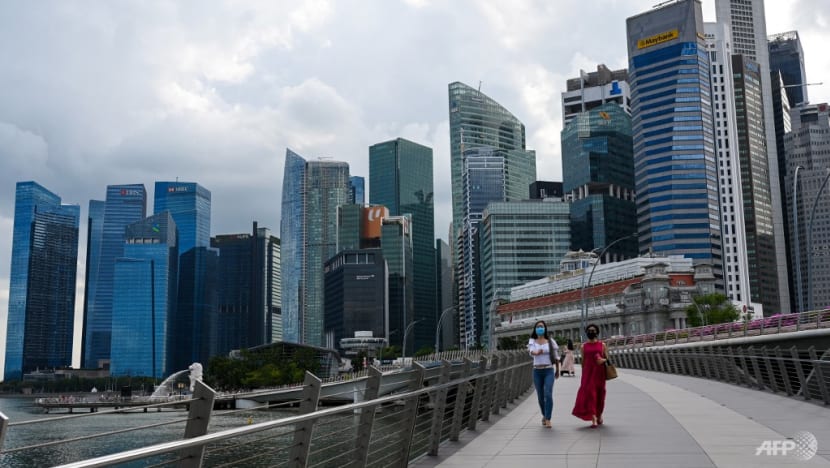Singapore's core inflation rises to 2.1% in December; prompts review of 2022 forecasts

People walk across the Jubilee bridge in Singapore on Dec 28, 2021. (File photo: AFP/Roslan Rahman)
SINGAPORE: Singapore’s core inflation in December rose to 2.1 per cent on a year-on-year basis, up from the 1.6 per cent reported in November, official data released on Monday (Jan 24) showed.
This was driven by an increase in services inflation, mainly due to a steeper increase in airfares which reflected the higher costs of travel on vaccinated travel lanes (VTL), said the Monetary Authority of Singapore (MAS) and the Ministry of Trade and Industry (MTI) in a joint media release.
The headline consumer price index, or overall inflation, jumped to 4 per cent year-on-year in December - up from 3.8 per cent in the previous month.
STEEP INCREASE IN AIRFARES
On a year-on-year basis, December's services inflation rose to 2.6 per cent from November's 1.9 per cent, driven primarily by a steeper increase in airfares.
"The steeper increase in airfares in December reflected both higher base fares as well as the additional costs of mandatory COVID-19 tests for the newly-introduced VTL flights," said MAS and MTI.
"Apart from airfares, point-to-point transport services costs, and tuition and other fees also rose at a faster pace," they added.
Accommodation inflation picked up to 3 per cent in December, up from 2.7 per cent in November, as housing rents increased more rapidly.
Electricity and gas inflation increased to 10.7 per cent due to a steeper rise in average household electricity prices, while food inflation rose to 2.1 per cent.
Private transport inflation fell to 15.5 per cent as the pace of increase in car prices and petrol costs eased, while the cost of retail and other goods fell at a slower pace to -0.7 per cent.
INFLATION OUTLOOK
MAS and MTI said that "significant uncertainty" surrounds the outlook for inflation in the near term, including from the costs of air travel and commodity prices such as food and oil.
On the domestic front, the recovery in the labour market is expected to become more entrenched with the easing of COVID-19 restrictions and a pickup in economic activity.
"Wages have increased and are anticipated to continue to rise at a steady pace as slack in the labour market dissipates. As the domestic COVID-19 situation stabilises, consumer demand should strengthen, with the possibility of a greater pass-through of accumulating business costs to consumer prices," they said.
On the global front, inflation also remains elevated and is likely to persist for some time before easing gradually towards the end of the year.
















